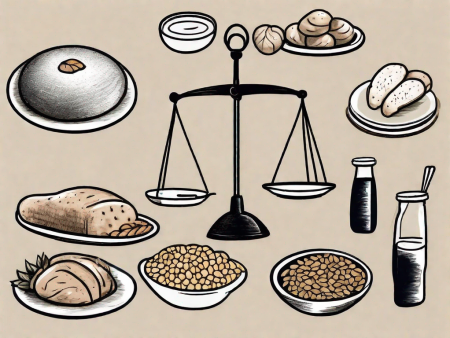Discover the potential advantages of adopting a gluten-free diet for individuals with diabetes.
Exploring the Benefits of a Gluten-Free Diet for Diabetes
Are you tired of the same old dinner options? Bored with the seemingly endless list of restrictions that come with managing diabetes? Well, hold on to your blood glucose meter, because we’re about to dive into the fascinating world of gluten-free diets and how they can benefit people with diabetes. Yes, you heard that right – gluten-free goodness might just be the secret ingredient you’ve been missing!
Understanding Diabetes: A Brief Overview
Before we embark on this gluten-free expedition, let’s take a quick refresher course on diabetes. This metabolic disorder affects the way your body processes glucose, leading to high blood sugar levels. But fret not – there are different types of diabetes, each with its own quirks and intricacies.
Diabetes is a complex condition that requires a comprehensive understanding. Let’s delve deeper into the three main types of diabetes: type 1, type 2, and gestational diabetes.

Types of Diabetes
There are three main types of diabetes, and each type has its unique causes and characteristics.
Type 1 diabetes is an autoimmune condition where the body’s immune system mistakenly attacks the pancreas, reducing or eliminating insulin production. This type of diabetes is typically diagnosed in childhood or early adulthood, and individuals with type 1 diabetes require lifelong insulin therapy to manage their blood sugar levels.
Type 2 diabetes, on the other hand, is often associated with lifestyle factors such as obesity and sedentary habits. It is the most common type of diabetes, accounting for approximately 90% of all diagnosed cases. Unlike type 1 diabetes, type 2 diabetes is often preventable and can be managed through a combination of healthy eating, regular physical activity, and medication if necessary.
Gestational diabetes is a temporary form of diabetes that can occur during pregnancy. It affects approximately 2-10% of pregnant individuals and usually resolves after childbirth. However, women who have had gestational diabetes are at an increased risk of developing type 2 diabetes later in life.
Common Symptoms and Complications
Diabetes comes with a whole bag of tricks, and not the fun kind. It is important to be aware of the common symptoms and potential complications associated with this condition.
Some of the common symptoms of diabetes include excessive thirst, frequent urination, unexplained weight loss, and fatigue. These symptoms may vary depending on the type of diabetes and the individual’s overall health.
However, the uncontrolled blood sugar levels associated with diabetes can lead to serious complications. These complications can affect various parts of the body and include heart disease, kidney damage, nerve damage, eye problems, and even amputation in severe cases.
Managing diabetes requires a multidisciplinary approach, involving healthcare professionals, dietitians, and individuals themselves. It is crucial to monitor blood sugar levels regularly, follow a balanced diet, engage in regular physical activity, and take prescribed medications as directed.
By understanding the different types of diabetes, recognizing the symptoms, and being proactive in managing the condition, individuals with diabetes can lead fulfilling lives while minimizing the risk of complications.
The Role of Diet in Diabetes Management
Now that we have the lay of the land, let’s talk about the importance of diet when it comes to managing diabetes. Spoiler alert: what you eat can make a world of difference! A well-balanced nutrition plan can help regulate blood sugar levels, improve overall health, and ward off those pesky complications.
But what exactly does a well-balanced nutrition plan entail? Let’s dive deeper into the topic.
Importance of Balanced Nutrition
Imagine your body as a finely tuned machine – it needs the right fuel to function at its best. When it comes to diabetes, it’s essential to maintain a well-rounded diet that includes a variety of fruits, vegetables, whole grains, lean proteins, and healthy fats. Remember, balance is the name of the game!
Fruits and vegetables are packed with essential vitamins, minerals, and fiber. They not only provide important nutrients but also help regulate blood sugar levels. Whole grains, such as whole wheat bread and brown rice, are rich in fiber, which slows down the digestion process and prevents sudden spikes in blood sugar levels. Lean proteins, like chicken, fish, and tofu, provide the necessary building blocks for the body while keeping you feeling full for longer. And let’s not forget about healthy fats, such as avocados, nuts, and olive oil, which are vital for heart health and overall well-being.
By incorporating a variety of these food groups into your diet, you can ensure that your body receives the necessary nutrients to function optimally and keep your blood sugar levels in check.
Impact of Carbohydrates on Blood Sugar Levels
Ah, carbohydrates – those sneaky little devils that can wreak havoc on your blood sugar levels. But fear not, brave soul! With a bit of knowledge and strategy, you can keep those carbs in check.
Carbohydrates are the main source of energy for the body, but not all carbs are created equal. When managing diabetes, it’s important to focus on consuming complex carbohydrates rather than simple carbohydrates. Complex carbohydrates, such as whole wheat bread, brown rice, and quinoa, break down more slowly in the body, preventing sudden spikes in blood sugar levels.
On the other hand, simple carbohydrates, found in sugary drinks, candies, and processed snacks, are quickly digested and can cause a rapid increase in blood sugar levels. It’s best to limit your intake of these foods or pair them with protein or healthy fats to slow down their absorption.
By being mindful of the types and amounts of carbohydrates you consume, you can better manage your blood sugar levels and maintain a stable energy supply throughout the day.
Remember, managing diabetes through diet is a lifelong commitment. It’s not just about what you eat but also about portion sizes, meal timings, and regular physical activity. Consult with a healthcare professional or a registered dietitian to create a personalized nutrition plan that suits your specific needs and goals.
What is a Gluten-Free Diet?

Now that we’ve mastered the basics of diabetes management through diet, it’s time to dig into the nitty-gritty of gluten-free goodness. But wait, what exactly is gluten? And why would anyone want to be free from it?
Gluten, a protein found in various grains such as wheat, barley, and rye, plays a significant role in the culinary world. It’s what gives dough its elasticity and bread its delightful chewiness. However, for individuals with celiac disease or gluten sensitivity, consuming gluten can wreak havoc on their digestive system and overall well-being.
Imagine a world where a simple slice of bread could cause severe discomfort, bloating, and even damage to the small intestine. That’s the reality for those who must adhere to a gluten-free diet. But fear not, gluten-free warriors – there is a way to navigate this dietary challenge and still enjoy a wide range of delicious alternatives.
Defining Gluten and its Sources
Gluten, derived from the Latin word “glūten,” meaning “glue,” is a complex mixture of proteins. It is primarily found in grains such as wheat, barley, and rye. These grains have been staples in human diets for centuries, providing sustenance and nourishment. However, for individuals with celiac disease or gluten sensitivity, the consumption of gluten can trigger an immune response, leading to various symptoms and long-term health complications.
Understanding the sources of gluten is crucial for those following a gluten-free diet. While it may seem straightforward to avoid obvious culprits like bread, pasta, and baked goods, hidden sources of gluten can lurk in unexpected places. Sauces, dressings, and even some processed meats may contain gluten as a thickening agent or flavor enhancer. Therefore, it is essential to read labels carefully and stay informed about potential sources of gluten.
It’s worth noting that gluten can also be found in less obvious products, such as soy sauce, beer, and certain medications. This underscores the importance of thorough research and open communication with healthcare professionals when embarking on a gluten-free lifestyle.
Basics of a Gluten-Free Eating Plan
A gluten-free diet, as its name suggests, involves abstaining from foods containing gluten. While this may initially seem restrictive, there is a wide array of delicious alternatives available to those on a gluten-free journey.
Grains like quinoa, rice, and corn are naturally gluten-free and can serve as excellent substitutes for their gluten-containing counterparts. These versatile grains can be used in various dishes, from hearty salads to comforting casseroles.
Additionally, individuals following a gluten-free diet can explore the world of gluten-free flours. Almond flour, coconut flour, and tapioca flour are just a few examples of alternative flours that can be used in baking and cooking. These flours not only provide unique flavors and textures but also offer a nutritional boost, often rich in fiber and healthy fats.
Embracing a gluten-free lifestyle also presents an opportunity to experiment with new flavors and ingredients. Ancient grains like amaranth and millet, as well as legumes such as chickpeas and lentils, can add depth and variety to meals. Furthermore, fruits, vegetables, and lean proteins remain essential components of a balanced gluten-free eating plan.
But it’s not just about the food. A gluten-free lifestyle extends beyond the kitchen. It requires careful attention to cross-contamination, especially when dining out or preparing meals in shared spaces. Separate utensils, dedicated cooking surfaces, and vigilant communication with food establishments are crucial to maintaining a gluten-free diet successfully.
While the initial adjustment to a gluten-free diet may seem daunting, it is important to remember that countless individuals have embraced this lifestyle and found joy, health, and culinary satisfaction along the way. With a bit of knowledge, creativity, and support, a gluten-free diet can be a fulfilling and delicious journey.
Connection Between Gluten and Diabetes
Now comes the juicy part – the connection between gluten and diabetes. Can these two seemingly unrelated entities really have an impact on each other? Prepare to be amazed!
Scientific Insights into Gluten and Insulin Resistance
Insulin, the hormone responsible for regulating blood sugar levels, takes center stage when it comes to the gluten-diabetes connection. Recent research suggests that gluten consumption may contribute to insulin resistance, making it harder for the body to process glucose effectively. This finding opens up a whole new realm of possibilities for managing diabetes through dietary adjustments.
Gluten Intolerance and Diabetes: Is there a Link?
While gluten intolerance and diabetes are separate conditions, some individuals may experience both simultaneously. Interestingly, studies have hinted at a potential link between the two. If you find yourself dealing with both gluten intolerance and diabetes, a gluten-free diet could be the superhero cape you’ve been searching for.
Advantages of a Gluten-Free Diet for Diabetic Patients
So, we’ve teased you with the gluten-diabetes connection, but now it’s time to dive headfirst into the deliciously advantageous benefits of a gluten-free diet for those fighting the blood sugar battle.
Potential Impact on Blood Sugar Control
One of the most promising advantages of a gluten-free diet for people with diabetes is its potential impact on blood sugar control. By eliminating gluten, you’re likely to reduce the number of processed, high-carbohydrate foods in your diet. This can lead to more stable blood sugar levels and greater overall control of your diabetes management.
Weight Management and Gluten-Free Diet
Maintaining a healthy weight is crucial for managing diabetes, and a gluten-free diet might just do the trick. By cutting out gluten-containing foods, you’re likely to tread on the path toward weight loss and better weight management. Plus, let’s not forget that gluten-free options can be just as delicious and satisfying as their gluten-filled counterparts!
So, dear gluten-conscious readers, the benefits of a gluten-free diet for diabetes are both tantalizing and promising. While the scientific research is still unfolding, there’s no harm in exploring this dietary avenue to see if it works wonders for you. Remember, managing diabetes doesn’t have to be a dull affair. With a sprinkle of creativity and a dash of adventure, your taste buds can embark on a gluten-free journey of delicious proportions!







